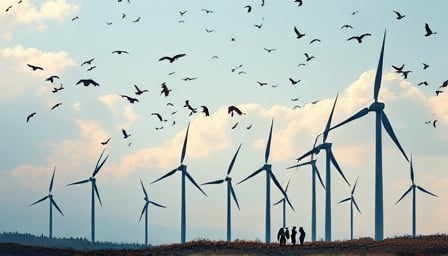Energiekontor AG Sells Scottish Wind Park to Uniper: A Strategic Shift or a Missed Opportunity?
In a move that has sent ripples through the renewable energy sector, Energiekontor AG, a leading German developer and operator of wind and solar parks, has sold its Scottish wind park project to Uniper, a global energy provider. This transaction, announced on June 10, 2025, marks a significant shift in Energiekontor’s portfolio and raises questions about the company’s strategic direction.
The Deal: A Closer Look
The Scottish wind park, located in the southwest of Scotland, boasts a total generation capacity of approximately 46 megawatts. The project includes seven Nordex N163 wind turbines, each with a maximum tip height of 200 meters and a rotor diameter of 163 meters. Once operational, the wind park is expected to generate around 158 gigawatt hours of electricity annually, enough to supply over 66,000 average households with renewable energy.
Strategic Implications for Energiekontor
Energiekontor AG, headquartered in Bremen and listed on the Xetra stock exchange, has long been a stalwart in the development and operation of eco-friendly electricity generating projects. With a market capitalization of €601.94 million and a close price of €42.6 as of June 8, 2025, the company has demonstrated resilience in the volatile energy sector. However, the sale of the Scottish wind park to Uniper UK, a subsidiary of the Düsseldorf-based Uniper, prompts a critical examination of Energiekontor’s future in renewable energy development.
A Missed Opportunity or a Calculated Move?
Critics argue that the sale represents a missed opportunity for Energiekontor to expand its footprint in the lucrative Scottish renewable energy market. The project’s significant capacity and potential to supply thousands of households with green energy could have bolstered Energiekontor’s position as a leader in sustainable energy production.
Conversely, proponents of the sale suggest that it reflects a strategic realignment towards more profitable or manageable projects. By divesting from the Scottish wind park, Energiekontor may be reallocating resources to projects with higher returns or lower operational complexities. This move could also be seen as a response to the challenging dynamics of the renewable energy sector, where rapid technological advancements and fluctuating regulatory landscapes demand agility and strategic foresight.
Market Reaction and Future Outlook
Following the announcement, Energiekontor’s stock experienced a modest uptick of 1.06%, reflecting investor optimism about the company’s strategic direction. However, the long-term impact of this sale on Energiekontor’s market position remains to be seen.
As Energiekontor navigates the complexities of the renewable energy sector, its ability to adapt and innovate will be crucial. The sale of the Scottish wind park to Uniper may be a pivotal moment in the company’s history, signaling a shift towards a more focused and potentially lucrative portfolio. Whether this move will ultimately benefit Energiekontor and its stakeholders depends on the company’s strategic execution and the evolving landscape of the global energy market.
In conclusion, while the sale of the Scottish wind park project to Uniper raises questions about Energiekontor’s strategic priorities, it also opens up new avenues for growth and innovation. As the company continues to develop and operate eco-friendly electricity generating projects, its commitment to sustainable energy production remains clear. The coming years will reveal whether this strategic shift positions Energiekontor for success in the competitive and ever-changing renewable energy sector.
